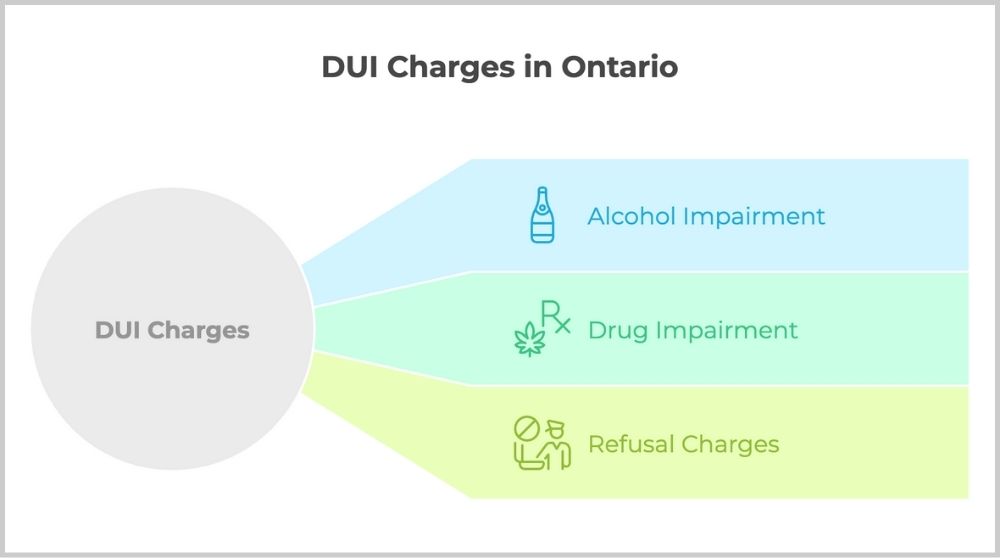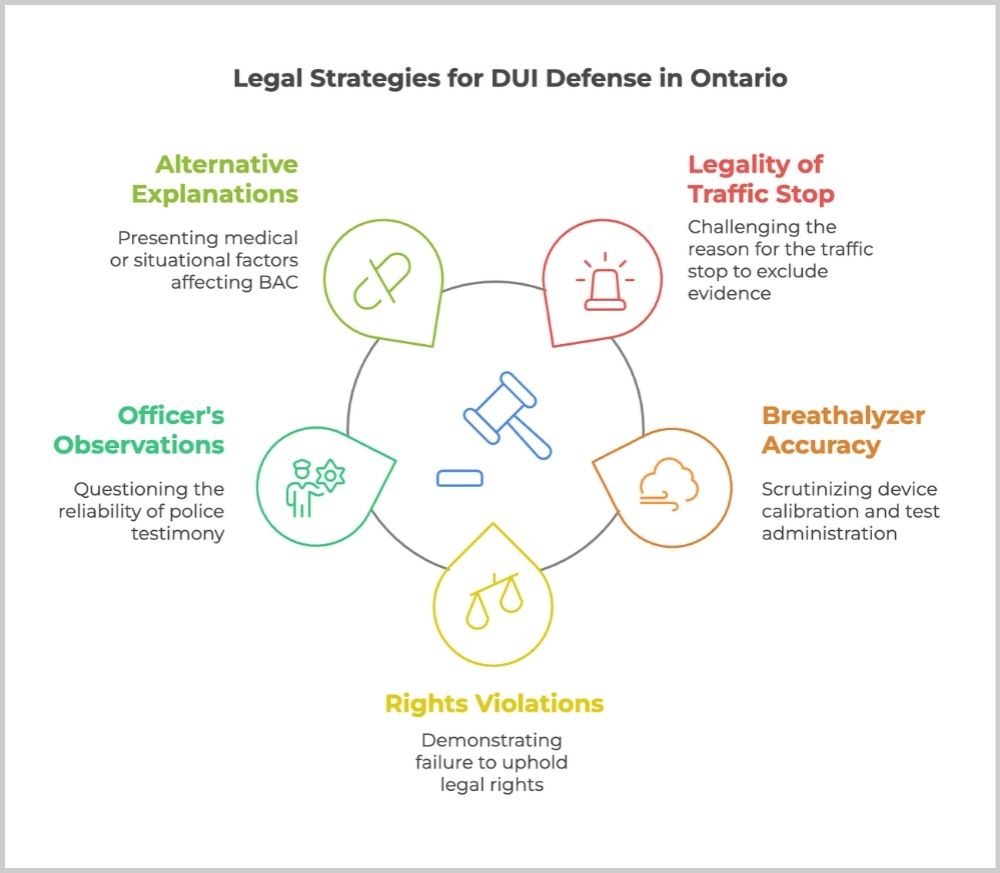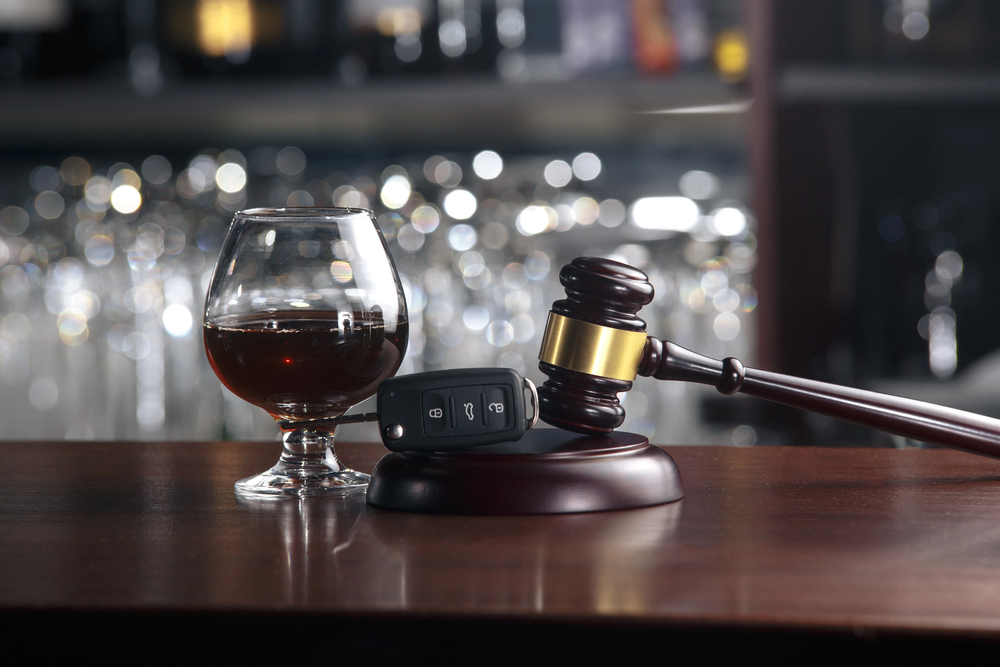How To Beat A DUI Charge in Ontario
Last Updated: August 9, 2024
Facing a DUI charge in Ontario can be overwhelming, but it’s important to know that there are strategies to fight it.
From identifying procedural errors to challenging the validity of evidence, a strong defence can make all the difference. In this article, we’ll explore proven methods to help you beat a DUI charge, protect your rights, and navigate the legal system effectively.
DUI charges in Ontario generally fall into three main categories:

- Alcohol Impairment: This includes cases where a driver’s BAC is over the legal limit of 0.08%, or where their ability to operate a vehicle is impaired by alcohol, regardless of their BAC level.
- Drug Impairment: With the legalization of cannabis and the ongoing opioid crisis, drug-impaired driving has become an increasing concern. This category includes impairment by illegal drugs, legal cannabis, and even prescription medications that affect one’s ability to drive safely.
- Refusal Charges: Under the Criminal Code, refusing to provide a breath sample or participate in standardized field sobriety tests when lawfully requested by a police officer is a separate offence, often carrying penalties similar to those for impaired driving itself.
Top Legal Defences Against a DUI Charge in Ontario
Challenging the Legality of the Traffic Stop
This is often a crucial first step in building a defence. In Ontario, as in the rest of Canada, police officers must have reasonable suspicion or probable cause to initiate a traffic stop.
If we can prove that the officer lacked a valid reason for pulling over the vehicle, any evidence gathered as a result of that stop may be deemed inadmissible in court. This could include breathalyzer results, field sobriety test observations, or any incriminating statements made by the accused.
Questioning the Accuracy of Breathalyzer and Field Sobriety Tests
This is another common and often effective defence strategy. Breathalyzer devices require regular calibration and maintenance to ensure accurate results.
Defence lawyers may scrutinize the maintenance records of the device used, looking for any lapses that could cast doubt on its reliability. Additionally, they may challenge the administration of the test itself, arguing that proper procedures weren’t followed, potentially skewing the results.
Field sobriety tests, such as walking in a straight line or standing on one leg, can be subjective and affected by factors unrelated to intoxication, such as physical disabilities, nervousness, or environmental conditions. A skilled lawyer may argue that these tests were administered improperly or that their results are unreliable due to external factors.
Demonstrating Rights Violations
This can be a powerful defence in DUI cases. Under the Canadian Charter of Rights and Freedoms, individuals have specific rights when interacting with law enforcement, including the right to be informed promptly of the reasons for their arrest and the right to legal counsel.
If these rights were not properly explained or were violated during the arrest process, it could lead to the exclusion of evidence or even a dismissal of charges. For instance, if the accused was not informed of their right to speak to a lawyer before providing a breath sample, the results of that test might be deemed inadmissible in court.

Raising Doubt About the Officer’s Observations
This is another strategy employed by our legal team. Police officers’ accounts of events leading to a DUI arrest are often crucial pieces of evidence. However, these observations can be subjective and sometimes inconsistent. A skilled lawyer may cross-examine the arresting officer, looking for inconsistencies in their testimony or a lack of supporting evidence for their claims of impairment. If significant doubts can be raised about the reliability of the officer’s observations, it can weaken the prosecution’s case considerably.
Presenting Alternative Explanations for High BAC Levels
This can be an effective defence, particularly in cases where breathalyzer results are just over the legal limit. Certain medical conditions, such as gastroesophageal reflux disease (GERD) or diabetes, can potentially affect breathalyzer readings, leading to falsely high results.
Additionally, the defence may argue the “rising blood alcohol” theory, suggesting that the accused’s blood alcohol level was below the legal limit while driving but rose above it by the time the test was administered. Expert witnesses, such as toxicologists or medical professionals, can be called upon to testify about these alternative explanations, potentially creating reasonable doubt about the accuracy of the BAC reading.

Charter Challenges: Violations of Rights
In Ontario, as in the rest of Canada, the Canadian Charter of Rights and Freedoms provides crucial protections for individuals accused of crimes, including those facing DUI charges.
Charter challenges can be a powerful tool in DUI defence, potentially leading to the exclusion of evidence or even the dismissal of charges if it can be demonstrated that the accused’s rights were violated during the arrest and investigation process.
Unlawful Search and Seizure, protected under Section 8 of the Charter, is a common ground for Charter challenges in DUI cases. This protection extends to breathalyzer tests and vehicle searches. Defence lawyers may argue that the police lacked reasonable grounds to demand a breath sample or search the vehicle.
For instance, if an officer requested a breathalyzer test without having a reasonable suspicion that the driver had alcohol in their body, this could be considered an unlawful search.
Similarly, if a vehicle was searched without proper justification or a warrant, any evidence obtained from that search might be deemed inadmissible. In cases where Charter violations are proven, the court must decide whether admitting the evidence would bring the administration of justice into disrepute. If so, the evidence may be excluded, potentially weakening the prosecution’s case significantly.
The Right to Counsel, enshrined in Section 10(b) of the Charter, is another critical area for potential challenges. This right stipulates that upon arrest or detention, individuals must be informed of their right to speak to a lawyer and be given a reasonable opportunity to do so before the police proceed with their investigation.
It’s important to note that Charter challenges are complex legal arguments that require a thorough understanding of constitutional law and relevant case precedents. The success of these challenges often depends on the specific circumstances of each case and how the courts interpret the Charter violations in the context of DUI investigations.
Procedural Errors That Can Lead to Case Dismissal
In the complex legal landscape of DUI cases in Ontario, procedural errors can significantly impact the outcome of a case, sometimes leading to a complete dismissal of charges. These errors, often made by law enforcement or prosecution teams, can provide strong grounds for defence lawyers to challenge the validity of the case against their clients.
Improper Documentation is a common area where procedural errors occur. Police reports are crucial pieces of evidence in DUI cases, providing detailed accounts of the arrest and the officer’s observations.
Missing or incomplete police reports can severely undermine the prosecution’s case. For instance, if the report fails to document important details such as the exact time of the traffic stop, the specific indicators of impairment observed, or the precise steps taken during field sobriety tests, it can create doubt about the reliability of the evidence. Defence lawyers may argue that these omissions make it impossible to properly evaluate the circumstances of the arrest, potentially leading to the exclusion of key evidence or even case dismissal.
Inadequate Evidence Handling can also lead to case dismissals.
The chain of custody for physical evidence, particularly blood or urine samples in DUI cases, must be meticulously documented and maintained. Any breaks in this chain, such as failing to properly label samples, leaving them unattended, or storing them in inappropriate conditions, can compromise the integrity of the evidence. Defence lawyers may challenge the admissibility of such evidence, arguing that there’s no guarantee the samples weren’t tampered with or mixed up.
In cases where blood alcohol concentration (BAC) results are crucial to the prosecution’s case, successfully challenging the handling of these samples can effectively dismantle the entire case against the accused.
Missed Deadlines or Improper Court Filings represent another category of procedural errors that can lead to case dismissals. The legal system operates on strict timelines, and failure to adhere to these can have serious consequences for the prosecution. For example, in Ontario, the prosecution must disclose all relevant evidence to the defence within a reasonable time frame. If they fail to do so, or if there are significant delays in disclosure, the defence may argue that this violates the accused’s right to a fair trial, potentially resulting in a stay of proceedings.

Reducing DUI Charges: Plea Bargains and Alternative Sentencing
Negotiating for Lesser Charges is a common approach used by experienced DUI lawyers. Through plea bargaining, it may be possible to convert a DUI charge into a lesser offence, such as “Careless Driving” under the Highway Traffic Act. This strategy can be particularly effective when there are weaknesses in the prosecution’s case or when the accused has no prior criminal record.
A reduction in Careless Driving can result in significantly lighter penalties, including lower fines, shorter license suspensions, and, importantly, the avoidance of a criminal record. This can have far-reaching benefits for the accused, preserving their ability to travel, maintain employment, and avoid the stigma associated with a criminal conviction.
Alternative Sentencing Options are another avenue explored by defence lawyers and sometimes offered by courts, especially for first-time offenders. These options aim to address the underlying issues that may have led to the DUI while reducing the punitive aspects of traditional sentencing.
Probation is a common alternative, where the accused agrees to certain conditions, such as not consuming alcohol or attending counselling sessions, in exchange for a more lenient sentence. Mandatory education programs, such as alcohol awareness courses or impaired driving workshops, are often incorporated into these alternative sentences.
Hiring an Experienced DUI Lawyer in Ontario
When facing DUI charges in Ontario, hiring an experienced lawyer who knows how to fight a DUI in Ontario can significantly impact the outcome of your case. When searching for a DUI lawyer, there are several key qualities to look for. First and foremost is experience with DUI cases specifically.
DUI law is complex and constantly evolving, so it’s crucial to work with a lawyer who specializes in this area and stays up-to-date with the latest legal developments. Look for a lawyer who has a deep understanding of Ontario’s DUI laws and regulations, including both criminal code offences and provincial Highway Traffic Act violations. A strong track record of successful outcomes in DUI cases is also essential, as it demonstrates the lawyer’s ability to navigate the complexities of these cases effectively.
The importance of local expertise cannot be overstated when it comes to DUI defence. A lawyer who is familiar with the local court system, including the tendencies of specific judges and prosecutors, can be invaluable. This local knowledge allows the lawyer to tailor their defence strategy to the particular nuances of the court where their case will be heard.
For example, they may know which arguments are most likely to resonate with a particular judge or which prosecutors are more open to plea negotiations. Familiarity with local court practices and procedures can also help ensure that your case proceeds smoothly, avoiding potential pitfalls that could arise from procedural missteps.
Final Thoughts
Beating a DUI charge in Ontario is challenging but not impossible. Throughout this article, we’ve explored various strategies that can be employed to challenge these charges effectively. From questioning the legality of the traffic stop and challenging the accuracy of breathalyzer tests to raising Charter rights violations and exploiting procedural errors, there are numerous avenues for defence. We’ve also discussed the potential for reducing charges through plea bargains and alternative sentencing options, which can significantly mitigate the consequences of a DUI charge.
However, it’s crucial to emphasize that successfully navigating these defence strategies requires in-depth legal knowledge, experience, and skill. The complexity of DUI laws in Ontario, combined with the potential severe consequences of a conviction, makes professional legal assistance not just beneficial but essential.
Get A Free Consultation
"*" indicates required fields



